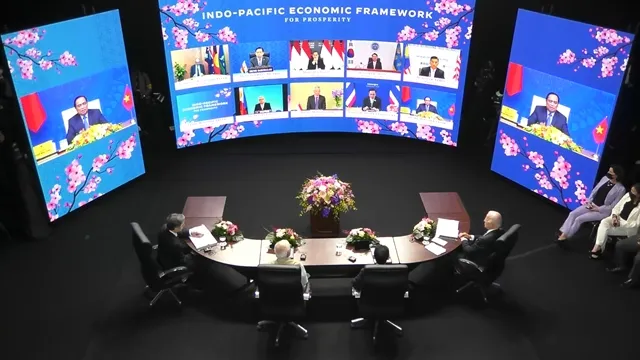
This framework offers four main pillars of support for the 14 countries covering trade, supply chains, clean energy, and tax.
Through this initiative, the IPEF partners have agreed to cooperate to strengthen the supply chain for essential goods such as for semiconductor chips and medical devices, and to respond well to any untoward emergency situation which would cause disruption to the vital supply chain link. This move is expected to help reduce the existing excessive dependency on the trade supply chain under China.
Mr. THOMAS HARRIS, Country Director of TMX Global in Vietnam, shared with Saigon Investment his thoughts on the supply chain industry in Vietnam after the IPEF agreement. TMX Global is a comprehensive supply chain consulting company with its headquarters in Melbourne in Australia.
JOURNALIST: - Sir, please can you tell us something about the current status of the supply chain and its relation to the logistics industry in Vietnam?
Mr. THOMAS HARRIS: - Vietnam is an emerging and rapidly growing market, with the supply chain and logistics industry showing strong potential in the international arena. Vietnam ranked at 10th place in the Logistics Index of Agile Emerging Markets in 2022, in which consumer electronics products from leading global technology companies such as Apple, Sony, and Samsung, have played an important role in driving this tremendous growth over the last few years.
In my opinion, Vietnam still has strengths in footwear production, apparel, and retail. Data from the Vietnam Textile and Apparel Association (VITAS) shows that Vietnam's export turnover of textiles, garments, and footwear had reached about USD 71 bln by 2022. We realize that businesses are looking towards Vietnam because of the relatively low costs.
In TMX report on "Cost of Doing Business in Asia", Vietnam emerged as one of the countries with the lowest business costs in the region, with only Cambodia and Myanmar being even lower. The average warehouse rental cost in Vietnam is also the 4th lowest, at USD 5 per square meter per month. Vietnam also boasts a huge and affordable workforce which is the 4th lowest affordable labor market in the region.
Nonetheless, we see that this growth has slowed in the first quarter of 2023, because of inflationary pressures and the slowing down of consumer demand. The reputable credit rating agency S&P Global recently reported that the manufacturing sector is currently experiencing its third consecutive decline and also the steepest decline since September 2021. However, this decline is quite normal due to weak consumer demand in the face of the current global economic downturn. But we expect Vietnam to regain its momentum in the very near future.
- Sir, what do you think will be the impact of IPEF on the supply chain and various businesses in Vietnam?
- While Vietnam's trajectory looks positive, the country is not immune to headwinds either. This is to say that when moving up the manufacturing value chain, Vietnam will become more vulnerable to global supply chain disruptions. According to research by TMX Global, these disruptions have already cost the Vietnamese economy a staggering SGD 2.6 bln a year.
It is therefore imperative that Vietnam continues to work towards strengthening its supply chain. With the agreement among IPEF member countries aimed at strengthening supply chains, one of the key initiatives is a framework for monitoring and regulating supply chains and labor, as well as handling any supply chain crisis that may occur.
As member countries cooperate and exchange best practices, industry knowledge, and resources in accordance with the IPEF agreement, then all Vietnamese businesses and the supply chain industry can look forward to possible policy improvements, better infrastructure, and innovation across industries.
Under IPEF agreement all Vietnamese businesses and supply chains will enjoy more stability in bilateral trade, as well as have the protection of partner allies. As Vietnam strengthens relations with the United States it will implement mutually beneficial supply chain plans and solutions.
On its part, the IPEF is committed to establishing three councils, namely, the Supply Chain Council, the Supply Chain Crisis Response Network, and the Labor Rights Advisory Committee. These agencies will help facilitate strong communication between countries to anticipate and prevent risks, as the countries involved will play an important role in all these councils.
- Sir, in your opinion what more can IPEF countries and businesses do to build a stronger supply chain in order to minimize any negative impact on the economy?
- Each IPEF country has its own strengths and challenges that it can seek to improve in each region. For instance, Vietnam could continue to build on its strengths with greater investment. Vietnam has spent a considerable amount on infrastructure enhancement compared to its other ASEAN counterparts. Accordingly, Vietnam is currently allocating about 6 percent of its GDP to infrastructure, more than double the average expenditure of any ASEAN country. This level of investment is expected to lead to significant growth in Vietnam's infrastructure sector in the coming years. This will benefit the country's supply chain as well as its logistics industry.
For businesses, the supply chain and logistics industry will constantly be changing as we see that there are continued and unpredictable disruptions. To keep up the pace, all processes require automation and data to be integrated, while workers need new resources and managers need better supply chain visibility. These requirements need investments in optimizing the supply chains to achieve the necessary results.
- Thank you very much.




















